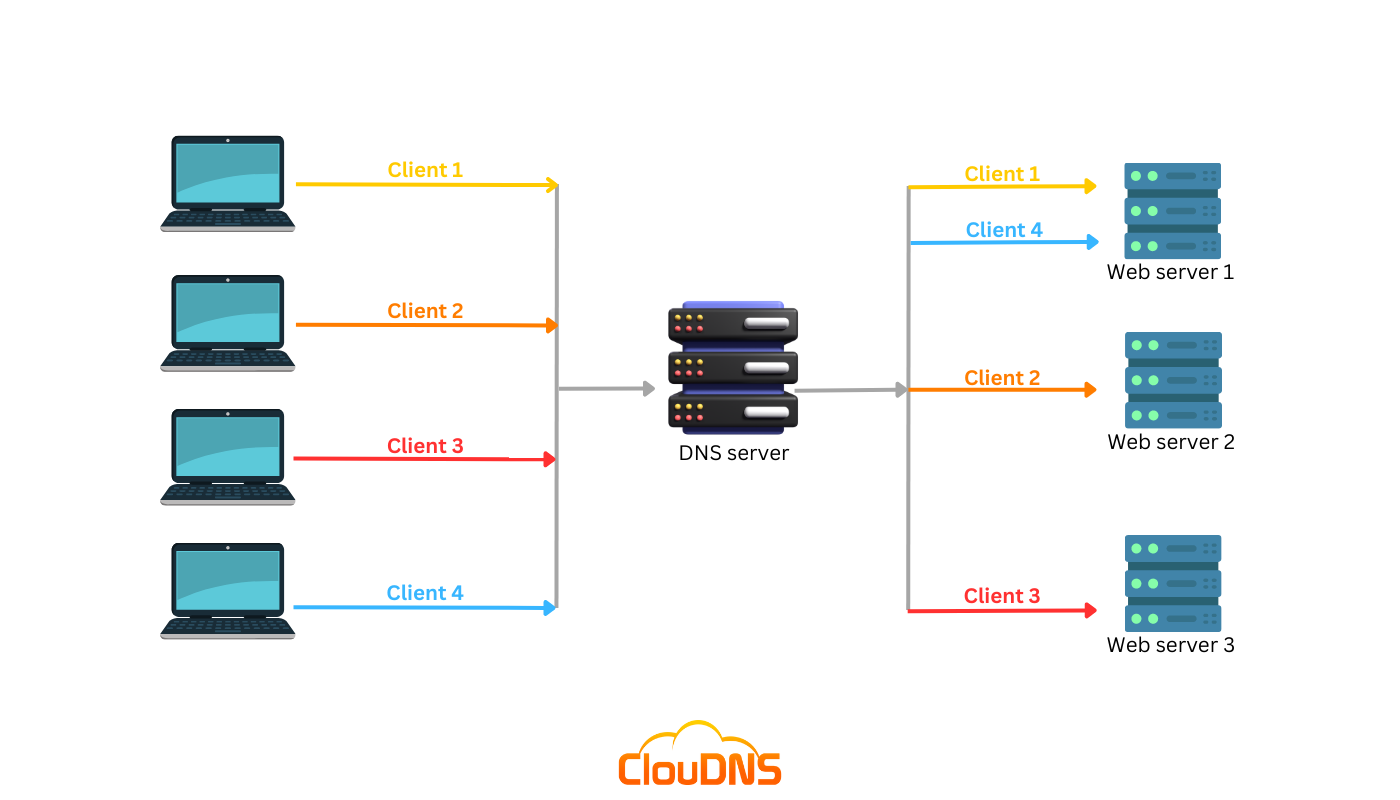What is Round-Robin DNS? Optimize Server Load
Round Robin DNS is a technique of load distribution, load balancing, or fault-tolerance provisioning multiple, redundant Internet Protocol service hosts (e.g. Web server, FTP servers), by managing the Domain Name System's (DNS) responses to address requests from client computers according to an appropriate statistical model.
Round robin DNS is often used to load balance requests between a number of Web servers. For example, a company has one domain name and three identical copies of the same web site residing on three servers with three different IP addresses. When one user tries to access the home page it will be sent to the first IP address. The second user who tries to access the home page will be sent to the next IP address, and the third user will be sent to the third IP address. In each case, once the IP address is given out, it goes to the end of the list. The fourth user, therefore, will be sent to the first IP address.
Why do you need Round-Robin DNS?
These days, load balancing is essential for huge web services that generate a tremendous amount of traffic. As you can imagine, web servers can easily get overloaded. For that reason, Round-Robin is certainly a good approach for avoiding such incidents. It is a proper way and one of the most commonly used methods to split the traffic on your servers.
Round Robin Example configuration:
| Host | Record Type | Points to: |
| example.com | A | ip.of.first.server |
| example.com | A | ip.of.second.server |
| example.com | A | ip.of.third.server |
How does it work?
Round-Robin DNS is a load balancing technique that works by rotating the IP addresses of the servers in a circular order. So, whenever a client requests a domain name, the DNS server responds with a list of IP addresses for that domain name, each time returning the IP addresses in a different order.

Benefits
Some of the main benefits of using Round-Robin DNS are:
- Easy to implement: Round-Robin DNS is easy to implement and does not require any special skills or knowledge.
- Improved scalability: It distributes incoming traffic among multiple servers, which helps to handle more requests and improve scalability.
- Load balancing: With this technique, the load is balanced among the available servers, which helps to prevent overloading any single server.
- High availability: Round-Robin DNS helps to ensure high availability by directing traffic to available servers. If one server goes down, the traffic is automatically directed to the remaining servers.
- Cost-effective: Round-Robin DNS is a cost-effective solution to distribute traffic among multiple servers. It does not require any additional hardware or software, and it can be easily configured.
Best Practices for Round-Robin DNS
To maximize the benefits of Round-Robin DNS, consider the following best practices:
- Monitor Server Health: Implement monitoring tools to observe the health and availability of servers in the pool. Automatically remove failed servers from DNS rotation to prevent client connections to inaccessible resources.
- Optimize TTL Values: Find a balance between rapid DNS propagation and reduced query traffic by optimizing TTL values for DNS records. Make sure to consider the latency, resilience, and DNS infrastructure load.
- Enable IPv6 Support: With the global adoption of IPv6, ensure that Round-Robin DNS configurations support both IPv4 and IPv6 addresses to accommodate clients and networks using different protocols.
- Regularly Review Configuration: Periodically review and update Round-Robin DNS configurations to reflect changes in server infrastructure, network topology, and traffic patterns. Adjust IP address assignments and TTL values as needed to maintain optimal performance and availability.
Support of Round-Robin DNS
ClouDNS provides full support for Round-Robin for all our DNS services, including the listed below. Just write to our technical support, if you need any assistance with your Round-Robin configuration. Our Technical Support team is online for you 24/7 via live chat and tickets.
FAQ
Question: What hosting plan I need to use Round-Robin DNS?
Answer: Round-Robin DNS is included in the Free plan and all Paid plans. Sign up for free from here.
Question: Can I use ALIAS record in my Round-Robin DNS configuration?
Answer: Yes, you can use both A and ALIAS records in the Round-Robin DNS configuration
Question: Can I use AAAA record in my Round-Robin DNS configuration?
Answer: Yes, you can use AAAA records in the Round-Robin DNS configuration
Question: Can I use CNAME record in my Round-Robin DNS configuration?
Answer: No, CNAME records are not supported for Round-Robin DNS configuration and cannot be used in combination with any other DNS record for a same host.
Question: Does Round-Robin depend on my server's current state?
Answer: No, it does not. In order words, if one of your servers is down, Round-Robin will not exclude the unreachable server from your current DNS configuration.
Question: If I have 2 "A" records in Round-Robin, will this simply mean that I'm going to have a clean 50/50 split in my traffic?
Answer: Because of the resolvers cache and client-side cache as well, you cannot be absolutely sure for your traffic to be split equally.
Last modified: 2024-09-24